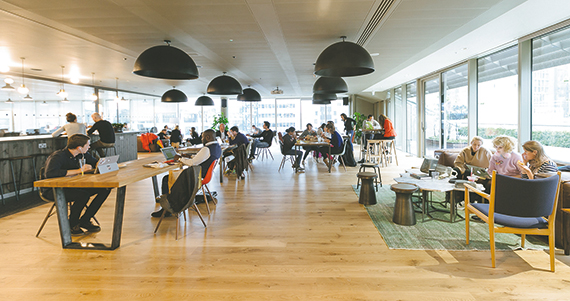 Kingboard Chemical Holdings’ acquisition of WeWork’s London flagship demonstrates investor appetite for the covenant of the $16bn (£13.1bn) shared workspace provider.
Kingboard Chemical Holdings’ acquisition of WeWork’s London flagship demonstrates investor appetite for the covenant of the $16bn (£13.1bn) shared workspace provider.
The Hong Kong-listed laminates manufacturer agreed to pay £271m for Moor Place, the 236,793 sq ft building on Fore Street, EC2, from Brookfield. The price reflects a yield of 4.86%.
Assuming the UK would vote to stay in the EU, Cushman & Wakefield and Strutt & Parker initially marketed the building in May for £290m, a yield of 4.5%.
Sceptics had questioned the basis of the valuation and the strength of the serviced office market in a downturn.
However, a source close to the deal highlighted that WeWork was not just a serviced office provider but also earned income from products it sold to its members, including health insurance.
Other factors that favour WeWork’s covenant included its relatively high member-to-space ratio, the fact that it is a global business, and its international backing. At a financing round in June, the New York-based company raised $430m from Chinese investors.
Moor Place is the second building occupied by WeWork to trade in London. The first was 33 Queen Street, EC4, which was bought by Corpus Sireo in May for £40m, a yield of 5%.
Nick Jacobs, chief executive of Rowan Asset Management, which with GI Partners let 62,000 sq ft to WeWork at Aldwych House, WC2, in September, said the “combination of brand and global covenant is highly accretive to our investment value”.
He added: “It is a global brand leader and miles ahead of the opposition in its thinking and delivery.”
KCH was advised by Savills.
Kingboard deal exploits currency slide
The KCH deal is the latest in a flurry by Chinese buyers looking to take advantage of sterling-denominated assets following the collapse of the pound in recent weeks.
More than £650m of Chinese capital has been deployed in the City and West End since 23 June, with Hong Kong investors particularly active, according to Savills research.
Stephen Down, head of central London investment at Savills, said private Asian investors were buying up more UK property than institutions because private investors saw the currency play as a window of opportunity.
Will the ‘bubble’ burst?
Serviced office companies deny that the asset class is a bubble waiting to burst.
Olly Olsen, co-founder and chief executive of The Office Group, said: “This flexible way of working is more than here to stay.
“The co-working phenomenon is moving people out from homes and coffee shops into professional working environments where you can connect with other like-minded people.
“A lot of people are entering the market quickly, and in time that will balance itself out.”
He added: “Some are going to want to come to The Office Group, some are going to want to go to the others.
“It is a little bit like a gym. There are different gyms for different people, different price points, and that will also balance itself out.”
Olsen said that the high valuations of serviced office companies reflected the strength of sentiment in the asset class, which had historically been seen as risky.
“We’re suddenly standing up and people are paying attention,” he said.
• To send feedback, e-mail louisa.clarence-smith@estatesgazette.com or tweet @LouisaClarence or @estatesgazette











